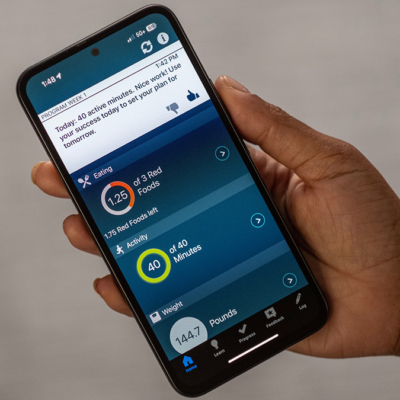This article originally appeared on unc.edu.
Written by Scott Jared, University Communications
Traditional in-person weight-management programs result in about 10% weight loss over six to 12 months, better results than people get using more convenient smartphone apps.
But a team of Carolina nutrition researchers is figuring out how to improve those mobile apps by making their goals and feedback more personalized — more like advice from a weight-loss coach, said Brooke Nezami of the Gillings School of Global Public Health.
Nezami is an assistant professor in the nutrition department and a behavioral scientist with the UNC Weight Research Program. The other Gillings nutrition department researchers on the team are professor Deborah Tate and assistant professors Carmina Valle and Heather Wasser.
In the early 2000s, Tate was among the country’s first researchers to use the internet to deliver weight-management interventions. That work evolved to using smartphones to reach people wherever they are and provide programs in a way that fits their schedules. Carolina’s weight research program is affiliated with Gillings, Lineberger Comprehensive Cancer Center and the Nutrition Research Institute.
The program has conducted more than 10 differently structured trials of digital weight management programs. Their studies and those by other researchers show that an app that provides specific goals and support can push users’ weight loss closer to 5% or about 10-15 pounds over three to six months.
Matching human feedback
Researchers found that an app needs at least three key functions to help users lose weight — personalized goals and feedback and the ability to track eating, physical activity and weight consistently. “Tracking doesn’t have to be perfect. You don’t have to do it every day, but if you’re consistent over time, it will help,” Nezami said.
The group is focused on refining the messages app users receive and their delivery. The pre-written, automated messages provide tailored strategies based on scientific evidence to help users make positive behavior changes. “Suggestions might be to reach out to someone they’re close to, to share their goals, to provide them with some accountability,” Nezami said.
The team is trying to get as close as possible to the human feedback of in-person programs. In a process refined over years, Nezami said, the team creates algorithms that enable apps to react quickly to user-provided data from activity trackers like Fitbits or devices like smart scales that transmit weight. Unlike with most commercial apps, the team uses the user’s data to create a personalized summary of weekly progress and offer tailored feedback, much like weight-loss coaches do.
Two of the lab’s ongoing projects are Nudge and AGILE, NIH-funded projects studying free programs designed to help young adults adopt healthier eating and activity habits and learn effective ways to manage their weight. The programs use a study smartphone app, digital health tools and personalized messaging.
“Our next step is to harness the potential of generative artificial intelligence to further transform our existing messages to more highly personalized messages for participants,” Nezami said.
In trying to improve the mobile programs, the lab works with Carolina’s Connected Health for Applications & Interventions Core, a resource for campus research groups that creates websites, apps and other digital projects. (Tate is the director of CHAICore.) Most of the weight research program’s recent studies have examined how to adapt messages to provide support at the best time.
“Our goal is to closely approximate what a human would do,” Nezami said. “We are aiming to make these improvements so that we can use mobile apps to reach more people, including those who need them most.”
Want to lose weight? Join one of the lab’s studies. If you can’t join a trial, find an app that enables you to track your weight, eating and activity and to receive personalized feedback. Some insurance companies cover and even offer weight-loss programs. Your doctor’s office may offer a program.

